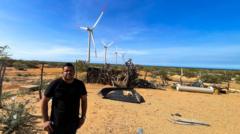Following a letter from significant climate experts urging reform of the COP climate talks, concerns grow regarding host countries’ commitment to phasing out fossil fuels. The recent COP29 conference in Azerbaijan has drawn criticism for its leadership's focus on natural gas amidst rising global temperatures.
Experts Call for Overhaul of COP Climate Talks Amid Criticisms

Experts Call for Overhaul of COP Climate Talks Amid Criticisms
Key figures in climate science argue UN's COP meetings need urgent reform to effectively address climate crisis.
The United Nations’ COP climate talks are coming under heavy scrutiny, with experts declaring them “no longer fit for purpose,” necessitating immediate reforms to effectively tackle the escalating climate crisis. This sentiment is highlighted in a letter to the UN signed by influential figures, including former UN Secretary General Ban Ki-Moon and former UN climate chief Christiana Figueres, emphasizing the failure of the current talks to meet urgent climate challenges.
The COP29 conference recently held in Azerbaijan has sparked concerns particularly over the host country’s continuing reliance on fossil fuels. Azerbaijani President Ilham Aliyev described natural gas as a "gift from God" during the summit and dismissed responsibility for its market deployment. This proclamation follows a troubling revelation about the COP29 leadership seemingly promoting investment opportunities in fossil fuels, undermining promises of renewable energy advancement.
While the UN talks have previously achieved notable milestones, such as the Paris Agreement aims to limit global temperature rise below 1.5°C, experts are troubled by how slowly these objectives are being implemented. They argue that the current COP structure cannot drive the essential rapid changes needed to secure a viable climate future.
Prominent climate scientist Johan Rockström stated, "Planet Earth is in critical condition," adding that the global climate policy process must evolve to facilitate faster and broader interventions amidst rising greenhouse gas emissions.
The letter from experts also criticizes the selection process for COP hosts, with Azerbaijan following the United Arab Emirates, another significant oil producer. Concerns have arisen that fossil fuel lobbyists outnumber the voices of scientific communities and vulnerable populations at these gatherings.
As discussions unfold, Figueres advocates for reforms ensuring host nations exhibit high ambition in adhering to the Paris Agreement, alongside calls for smaller, more frequent conferences that hold signatories accountable for their climate promises. This growing discourse reflects an urgent need for a systemic overhaul in the approach to climate negotiations if progress in combating climate change is to be achieved effectively.





















